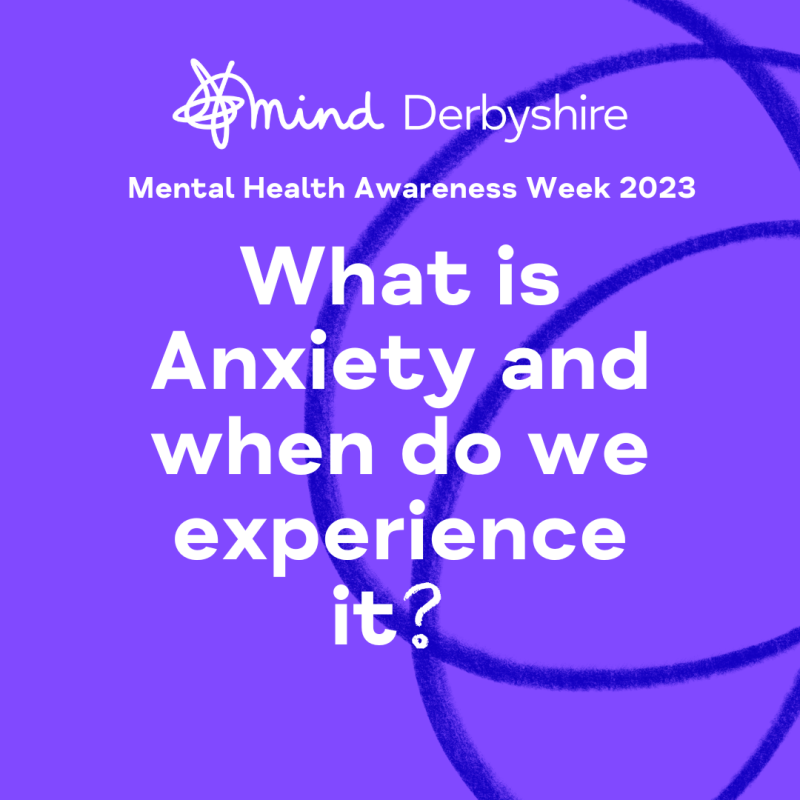MHAW23: What is Anxiety and when do we experience it?
15 May 2023

What is anxiety?
Anxiety is what we feel when we are worried, tense or afraid – particularly about things that are about to happen, or which we think could happen in the future. Anxiety is a natural human response when we feel that we are under threat. It can be experienced through our thoughts, feelings and physical sensations.
“For me, anxiety feels as if everyone in the world is waiting for me to trip up, so that they can laugh at me. It makes me feel nervous and unsure whether the next step I take is the best way forward.”
Anxiety is a feeling of unease, fear, or apprehension about a future event or situation. It is a normal human emotion that can help us deal with stressful or dangerous situations. However, when anxiety becomes excessive or persistent, it can interfere with daily activities and lead to significant distress. Anxiety can manifest in different forms such as generalised anxiety disorder, panic disorder, social anxiety disorder, and specific phobias. Symptoms of anxiety can include excessive worry, restlessness, irritability, muscle tension, difficulty concentrating, and sleep disturbances. Anxiety disorders are treatable, and various treatment options such as therapy, medication, and lifestyle changes can help alleviate symptoms and improve quality of life.
When do we experience anxiety?
Anxiety can come up in lots of different situations. For example, we might:
- Hear a worrying story in the news – anywhere in the world or close to home.
- Have something important or stressful coming up, like an exam or a job interview.
- Think about something that could get worse, like not being able to pay rent on time or someone close to us being ill.
But it’s not only when something significant is happening in our lives. We might experience anxiety from a small thing, or lots of small things. For most of us, after the situation has passed, the anxiety usually passes too.
Effects of anxiety on your body
These can include:
- a churning feeling in your stomach
- feeling light-headed or dizzy
- pins and needles
- feeling restless or unable to sit still
- aches and pains
- faster breathing
- a fast, thumping or irregular heartbeat
- sweating or hot flushes
- sleep problems
- grinding your teeth, especially at night
- nausea (feeling sick)
- needing the toilet more or less often
- changes in your sex drive
- having panic attacks.
Effects of anxiety on your mind
These can include:
- feeling tense, nervous or unable to relax
- having a sense of dread, or fearing the worst
- feeling like the world is speeding up or slowing down
- feeling like other people can see you’re anxious and are looking at you
- feeling like you can’t stop worrying, or that bad things will happen if you stop worrying
- worrying about anxiety itself, for example worrying about when panic attacks might happen
- wanting lots of reassurance from other people or worrying that people are angry or upset with you
- worrying that you’re losing touch with reality
- low mood and depression
- rumination – thinking a lot about bad experiences, or thinking over a situation again and again
- depersonalisation – a type of dissociation where you feel disconnected from your mind or body, or like you are a character that you are watching in a film
- derealisation – another type of dissociation where you feel disconnected from the world around you, or like the world isn’t real
- worrying a lot about things that might happen in the future
Anxiety symptoms can last for a long time, or come and go. You might find you have difficulty with day-to-day parts of your life, including: looking after yourself, holding down a job, forming or maintaining relationships, trying new things or simply enjoying your leisure time.
For one to one support for symptoms of anxiety, click here to find out more about our Supported Self Help Service:
Supported Self Help – Derbyshire Mind
Check out our other blog that tells you how you can look after your wellbeing to support your anxiety:
MHAW23: How can I look after my wellbeing to support my anxiety? – Derbyshire Mind